Local News
Shaarey Zedek Cemetery update
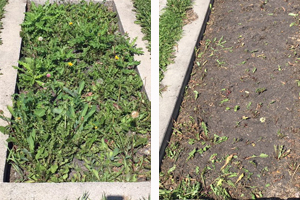
By BERNIE BELLAN
In previous issues we reported on changes the Shaarey Zedek had made to the maintenance of its cemetery as a result of the pandemic.
In our June 10 issue we noted that the synagogue board had decided to forego the planting of flowers on graves that would ordinarily have had flowers planted in keeping with perpetual care agreements.
In an email issued by the Shaarey Zedek in late May, recipients of the email were told that, notwithstanding the commitment that “Perpetual Care shall include the planting of flowers, (emphasis ours) cutting of grass, changing the soil and sod, renovating of concrete (if same surrounds the plot), as determined necessary by the Cemetery Committee in its sole discretion… After a lengthy discussion and in consideration of the unique situation this year due to the Coronavirus, the Cemetery Committee agreed unanimously to suspend the purchase and planting of flowers for this year.”
Not surprisingly, therefore, the conditions of gravesites that had, until this year, been planted with flowers, began to be festooned with weeds.
On July 24 we received an email from a reader who was particularly disturbed over the condition of his spouse’s gravesite. That reader sent pictures with his email which showed a gravesite covered in weeds. He noted that he had also sent an email to Ian Staniloff, Executive Director of Shaarey Zedek Congregation, in which he asked why his wife’s grave was in such deplorable condition, even though he had a perpetual care agreement?
Subsequent to our receiving that email, we received an email in which Ian Staniloff responded to the reader’s complaint. Ian wrote, in part:
“In order to compensate for the loss of additional employees whose main focus was planting flowers, watering and weeding individual graves, we incorporated a volunteer component from within the synagogue to handle these duties, leaving the overall grass cutting/weeding to the regular maintenance staff.. As you can imagine however, with almost 11,000 graves to maintain in a cemetery that covers 24 acres, the process takes quite a bit of time to complete the entire cemetery.
“We didn’t stop the spraying of weeds due to high cost. The most effective weed spray that we utilized had been banned by the province of Manitoba 2-3 years ago due to it containing 24D, and we were not able to control the spread of weeds/dandelions with an inferior product (which by the way was more expensive). Over the last couple of years we have been able to keep the weed problem at bay by having the specific flower planters, remove the weeds on each individual grave as they tended to the flowers.
“By not having these planters initially it was left up to the regular grass cutters to maintain the overall cemetery. However, we have determined that the problem is growing and have now hired additional staff specifically to deal with the weeds/existing flowers on all the graves. The results of their efforts should be evident. I will advise that this all takes some time, but I wanted you to be assured this is not something we take lightly. We are very proud of the appearance and grounds of our cemetery and are doing
our utmost to ensure that the high quality we have enjoyed in the past is being maintained.”
I decided to go down to the cemetery myself to see what the situation was. On Thursday, July 30 I rode my bike to the cemetery. (I thought it would be easier to take in the entire cemetery by bike rather than on foot and it gave me a convenient excuse to go for another long bike ride.)
The majority of the cemetery appeared to be in excellent shape, but I did notice that several gravesites which would normally have had flowers on them were still weed-infested, as our reader had pointed out. However, I did come across two young women who were hard at work pulling weeds out by hand. They told me they were working their way westward to the newest graves and expected to have all graves properly weeded in due course.
While I was in the cemetery I sent this email to Ian Staniloff:
“Hi Ian
“I’m in the cemetery now it all looks pretty good to me. I’m just curious: Did you take care of the problem by hiring additional workers?
“I’m in the newest section now and from what I can see you’re going to run out of room in a short while. What’s the plan going forward?
“Bernie”
Ian Staniloff responded:
“Bernie,
“I’m glad you see that we have done our utmost to respond to our congregants’ concerns regarding the cemetery. Some of the work was done utilizing volunteers, but the majority of the work was done by re-hiring some of the seasonal people who were not initially brought back.
“In terms of our future, we have at least 15-20 years of available space in our cemetery. There are areas that remain to be developed, including and most notably at the front (East Side) of the property.
“I hope this provides a bit of an answer.
“Cheers,
“Ian”
Local News
New Israeli restaurant opens in River Heights

By BERNIE BELLAN (July 6, 2025) It’s been a long time since our community has been able to welcome the opening of a restaurant that specializes in Israeli food.
That void is now going to be filled with the opening of The Green Falafel, at 1833 Grant (corner of Centennial – next to the Subway).
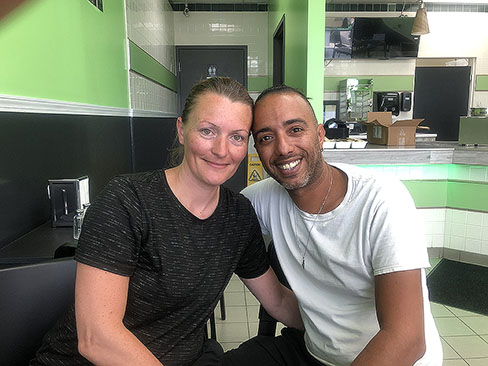
The restaurant is the fulfillment of a dream long held by the husband and wife team of Ariel and Eden Maudi, who have been living in Winnipeg the past 11 years.
Ariel, who was born in Israel and grew up in Beer Sheva, says that he worked in telecommunications in Ramat Gan for several years. He adds though that he had always dreamed of owning his own falafel stand in Israel, but life was difficult there and he decided to come to Canada as a tourist to see whether there were any opportunities here for him, Eden and their two young children.
Eden, who was born in Russia and moved to Israel with her family in 1996, stayed behind with the two kids, who were both pre-schoolers, while Ariel tested the waters in Canada first.
Ariel says he came to Canada as a tourist in 2013. His first stop was in Toronto, where he acquired his 1st class driver’s license. At the end of 2013 he moved to Winnipeg where he began working as a truck driver. Soon he found himself employed as a successful sales person at Vickar Nissan where, he says, he once achieved the status as the top car sales person in Canada. After working at Vickar Nissan for a number of years, Ariel began working as an installer for Bell MTS.
Meanwhile, Eden began working at a Walmart, later at the Costco on Regent.
But, when the opportunity to move into a space that had been previously occupied by another restaurant, but which had closed, became available, Ariel and Eden decided to open their own Israeli restaurant in an area that hadn’t seen Israeli food served since the controversial closure of Bermax Café in 2019.
The Maudis say that they will be serving a variety of Israeli dishes – all vegetarian, and that they will be fully kosher.
The “green” in Green Falafel, by the way, Ariel Maudi explains, comes from the cilantro and parsley that are added to the chickpeas. In addition, their pitas will be coming from Israel and will be baked fresh daily.
The Green Falafel will be open from 10-8 daily. Delivery will be available through Uber Eats and DoorDash.
Call 204-557-7837 for information.
Local News
Previews of shows with Jewish performers at this year’s Fringe Festival July 16-27

For show dates and venues go to winnipegfringe.com
By BERNIE BELLAN As has been our custom for many years now we try to find shows that have either Jewish performers or themes that would have particular appeal for Jewish audiences. Many of the Jewish performers at this year’s festival have been here before, but several are new. In no particular order here are blurbs about the shows we’ve found that fit the criteria I’ve just described. (By they way, if we’ve omitted a show that should be included in our list there’s plenty of time to get added to this post. Just drop me a line at jewishp@mymts.net.)

You’ve Been Served: A One-Woman Show About Divorce, Cults, and Coming of Age at Midlife
Noemi Zeigler
You are hereby summoned… to laugh, cry, and maybe belt out a Streisand number in solidarity. You’ve Been Served is a raw and riotous solo comedy by writer-performer Noemi Zeigler. It all begins when Noemi is served divorce papers on top of a garbage bin lid while taking out the trash—an undignified start to a full-blown midlife unraveling.
At 50, still clinging to her dream of becoming a singer, she falls under the spell of a music producer slash self-help guru, joins a spiritual cult, and, instead of landing a record deal, she lands in jail. Behind bars, with help from her long-buried inner child, she begins to reclaim her voice and her power. Turns out, dreams really do come true—just not the way she expected.
The show features vividly drawn characters—including a manipulative cult leader, a toxic ex-husband, and a jail guard named Roach who shares Noemi’s obsession with the fashion of Charlie’s Angels (the ‘70s TV version, of course.)
With salsa dancing, twerking, and a belting rendition of Don’t Rain on My Parade, Zeigler dives into abandonment, reinvention, and self-rescue. As she confronts perimenopause, she discovers it’s not the end—it’s the new puberty. The show touches on grief, sexuality, and spiritual confusion, but Noemi’s childlike optimism asks: What if your breakdown is actually your breakthrough?

You’re good for nothing… I’ll milk the cow myself
Written & Performed by Natacha Ruck
France, 1981: The first socialist president is about to be elected and young Natacha is ready to implement her own political platform. But first, she has to take down the schoolyard bully,emasculate the rules of French grammar and make off with grandmother’s chocolate.
If you think you know the limits of Jewish mothers, evil grandmothers and transcontinental lovers, meet Natacha Ruck’s family. This true tale of three generations of women, facing three world wars, is equal parts hilarious, shocking and zany.

A One Human Being, Potentially Comedic Performance of Beauty and the Beast NEW WORK!
Written & Performed by Alli Perlov
Be our guest! Local high school drama teacher Alli Perlov is back for a tale as old as time. Can she sing? Not really. Can she act? That’s debatable. Will you laugh? Oh… probably.
Perlov plays dozens of characters, some human, some animal, and many objects, in a comedic exploration of Beauty and the Beast.
In an homage to this brilliant musical adventure, through witty commentary and unstoppable energy, Perlov aims to entertain an audience that isn’t forced to be there like her students.

Hockey Sticks and Beaver Pie
Written & Performed by Melanie Gall
Take a trip around Manitoba. From the 30,000 ft. St. Adolphe snow maze to the Narcisse snake dens! After all, where else holds both the title of Slurpee Capital of the World and the Guinness Record for the most people simultaneously howling like wolves?
Deanna Durbin, Terry Jacks and Burton Cummings are among the many homegrown stars, and Hockey Sticks features their music along with original songs and the stories that make this province unique.
Starring Melanie Gall from past shows Piaf & Brel, Ingenue and Toast to Prohibition
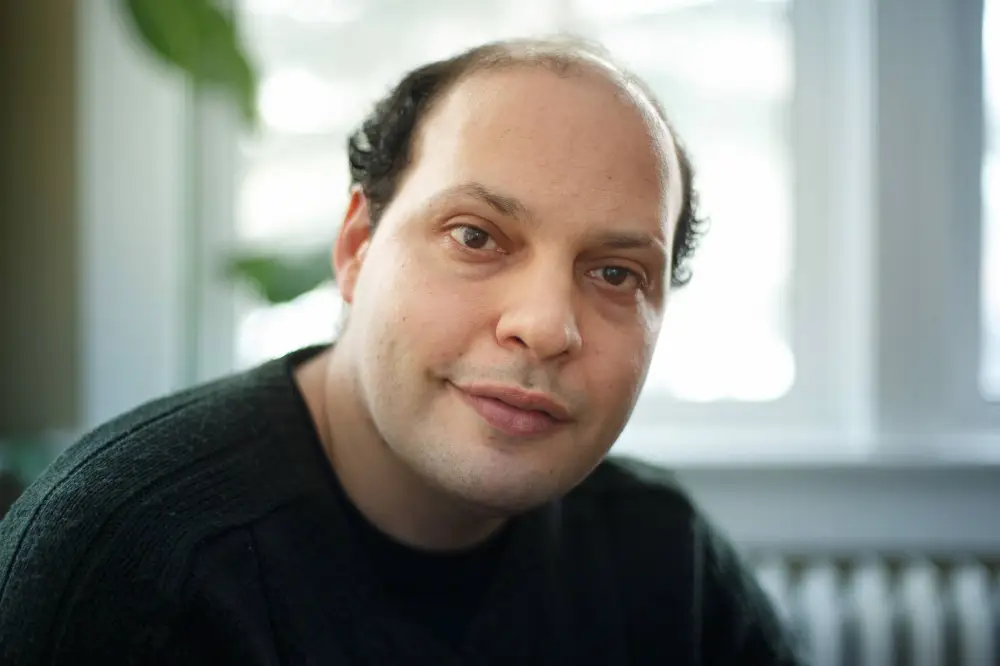
Nerohilarity Exposed
Produced by Adam Schwartz
We all sometimes feel exposed, whether that’s as a fraud or a pretender.
The performers of the award-winning Neurohilarity show, Danielle Kayahara (Laugh Out Loud CBC), Carole Cunningham (Yuk Yuks, The Debaters), Adam Schwartz (Winnipeg Fringe) and Rollin Penner (Yuk Yuks, CBC, Rumors, Winnipeg Comedy Festival), apply a comedic spin to the experiences that make us feel insecure, stripping away the emotional weight with nittygritty jokes and stories that will have you laughing uproariously.
Brilliantly awkward.
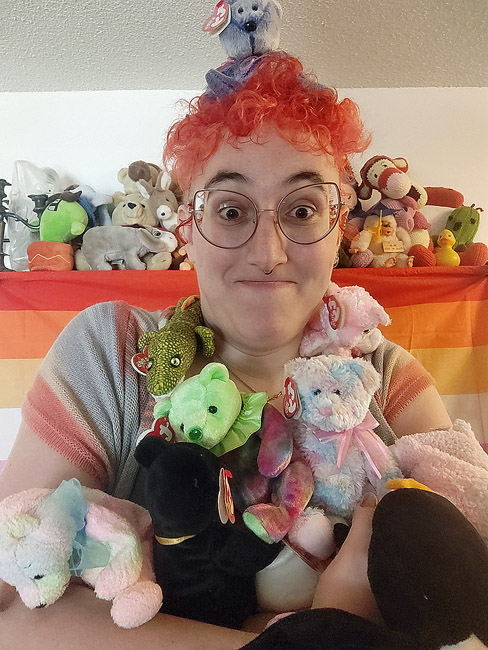
A Lesbian in the Kitchen
Willow Rosenberg
Professional lesbian Willow Rosenberg takes you on a journey through the centuries, superstitions and tablespoons of her lifelong passion for baking in this spiritual successor to 2024’s Jenny Award-nominated A Lesbian in a Bear Store.
Whether you have a favourite spatula, bake once or twice a year, or live in constant fear of being told to “just fold it in”, this one-woman show about family, joy, tradition (but make it gay),
Judaism, comfort, home (but make it gayer*), love, chemistry and magic is for you!
*Who’re we kidding, it’s all gay!

Eleanor’s Story: An American Girl in Hitler’s Germany
Written & Performed by Ingrid Garner
(Ed. note: Although Ingrid Garner isn’t Jewish, we thought the theme of this show might have a special appeal for Jewish readers.)
Based on Eleanor Ramrath Garner’s best-selling memoir, this 16x internationally award-winning adaptation – performed by her granddaughter, Ingrid Garner – details Eleanor’s youth as an American caught in Second World War Berlin.
Punctuated with humour and accompanied by cinematic sound and video, Garner embodies her ancestors in this coming-of-age odyssey, delivering an account of war that is more relevant than ever.

Reviewing The Free Press 2
Benji Rothman
The Winnipeg Free Press has run amok, reviewing each and every Fringe show over the past two decades without consequence or recourse. Now, it’s their turn… again.
In this refurbished work that debuted at last year’s Winnipeg Fringe, Benji Rothman once again takes the Winnipeg Free Press to task. In this (mostly) new, (hopefully) hilarious 45-minute show, Rothman dives deep into their past and exposes their faulty journalism, imbalanced reporting and, of course, embarrassing typos.
Local News
Jewish performers at this year’s Winnipeg Folk Festival July 10-13

The Black Sea Station
Long ago, there were the klezmorim, itinerant musicians who roamed the back streets of Eastern Europe, playing at parties for meals and a few coins. The sound they honed then was a visceral exploration of life’s joy, and its loss; they could whip audiences into a frenzy of dancing, or bring them to tears with the mournful wail of a clarinet. Today, Winnipeg’s own The Black Sea Station is carrying on this tradition. Featuring Daniel Koulack (bass), Victor Schultz (violin) and Myron Schultz (clarinet) — cofounders of seminal local klezmer act Finjan — along with Moldovan accordion wizard Nikolai Prisacar and multi-instrumentalist Ben Mink, the quintet transports listeners to a time and place long past. Through a mix of original songs rooted in history, and traditional tunes spun up with modern zest, they whirl through the exuberant klezmer sounds of their Eastern European heritage, tending the old ways with deep love and respect.
The Black Sea Station will be performing Sunday, July 13, at 1:00 pm in Snowberry Field.
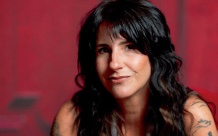
Romi Mayes
Romi Mayes has taken some hard knocks in her life, but she’s never faded away. For more than 25 years, Manitoba’s first lady of blues-rock has been a lynchpin of the Canadian roots scene. She earned that position the old-fashioned way, through her gritty, passionately emotive music. With her sizzling guitars and full-throated rasp, the Juno-nominated performer howls and purrs through razor-edged lyrics, rocking out wherever she can find a stage. She’s long been one of the hardest-working musicians on the circuit, keeping a busy slate of gigs and mentoring up-and-coming artists to get a foothold on the trails she blazed. Now, after a nine-year hiatus from the studio, Mayes has put her scintillating sound back on record with her long-awaited seventh album, Small Victories — a return that leaves no doubt, no matter the ups and downs, Mayes is here to stay.
Romi will be performing Friday, July 11, at 1:00 pm in Burr Oak.

Leonard Podolak (with Matt Gordon)
Ireland’s Matt Gordon is a fiddler and singer, whose fleet-footed clogging and thigh-slapping hambone has taken stages by storm since the 1980s. Leonard Podolak is a virtuosic master of the clawhammer banjo, who for decades has whipped up some of Manitoba’s wildest roots parties with his band, The Duhks. Put those talents together, and they can promise you this much: we’re all gonna have a real good time. Longtime friends and musical collaborators, Gordon and Podolak deliver an exhilarating trip through old-time Appalachian music. Their performances seamlessly blend intricate instrumental lines with heartfelt singing and dazzling dance. They’ve teamed up on a few records over the years, including 2020’s bigband extravaganza Power Wagon: Live At Shanley’s. But the best way to experience this duo’s toe-tapping, hand-clapping chemistry is to see it live.
Podolak and Gordon will be performing A concert with a side of clogging Sunday, July 13, at 3:00 pm in Folk School.
